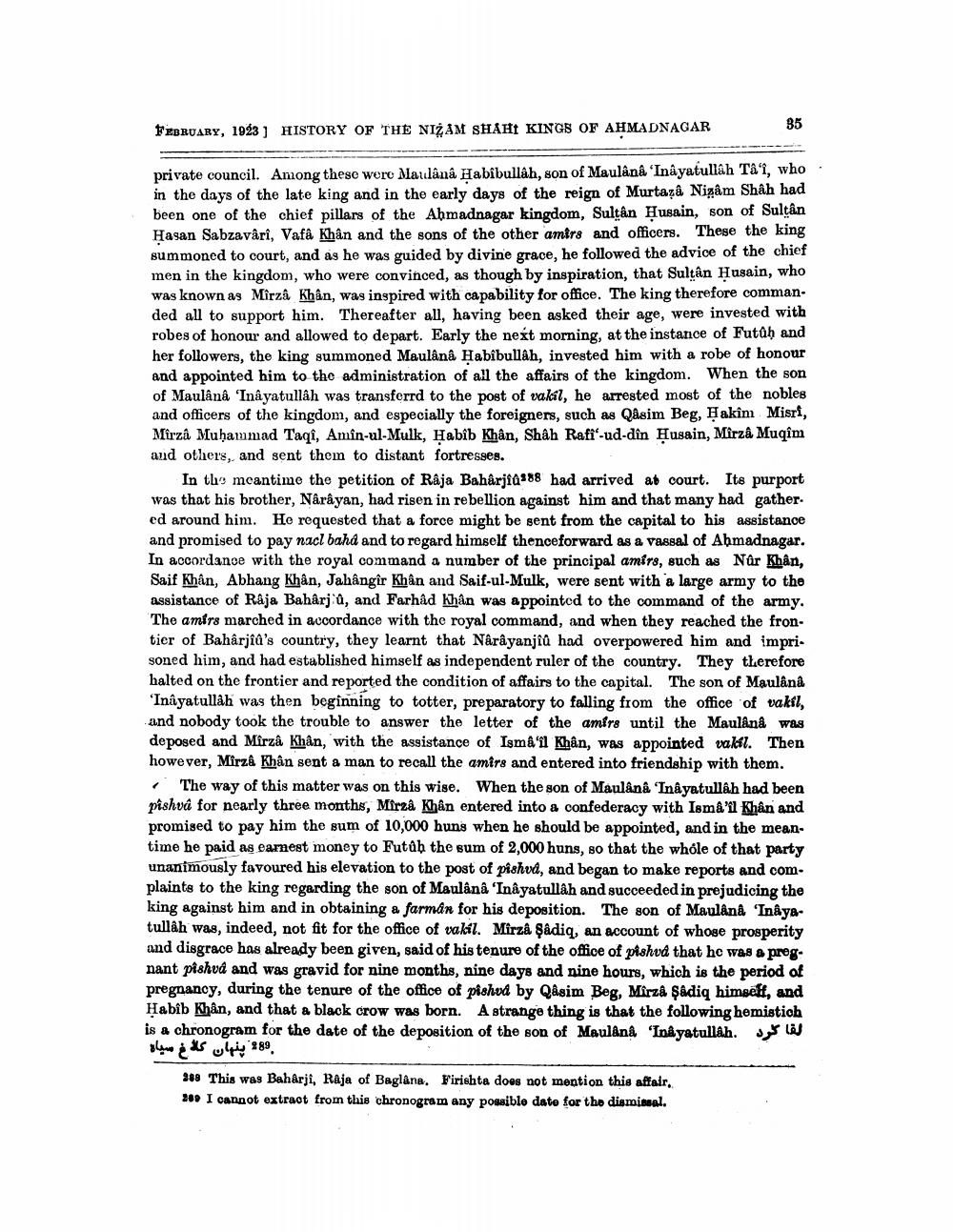________________
BRUARY, 1923) HISTORY OF THE NIŻAM SHAH KINGS OF AHMADNAGAR
85
private council. Among these were Maulânâ Habibullah, son of Maulând 'Inayatullah Ta'i, who in the days of the late king and in the early days of the reign of Murtaza Nigam Shah had been one of the chief pillars of the Ahmadnagar kingdom, Sultan Husain, son of Sultan Hasan Sabzavári, Vafa Khân and the sons of the other amirs and officers. These the king summoned to court, and as he was guided by divine grace, he followed the advice of the chief men in the kingdom, who were convinced, as though by inspiration, that Sultân Husain, who was known as Mirza Khân, was inspired with capability for office. The king therefore commanded all to support him. Thereafter all, having been asked their age, were invested with robes of honour and allowed to depart. Early the next morning, at the instance of Futâh and her followers, the king summoned Maulânâ Habibullâh, invested him with a robe of honour and appointed him to the administration of all the affairs of the kingdom. When the son of Maulânâ 'Inayatullâh was transferrd to the post of vakil, he arrested most of the nobles and officers of the kingdom, and especially the foreigners, such as Qasim Beg, akim Misri, Mirza Muhammad Taqi, Amîn-ul-Mulk, Habîb Khân, Shah Rafi'-ud-din Husain, Mirza Muqim and others, and sent them to distant fortresses.
In the meantime the petition of Raja Bahârjias88 had arrived at court. Its purport was that his brother, Narayan, had risen in rebellion against him and that many had gather. ed around him. He requested that a force might be sent from the capital to his assistance and promised to pay nacl bahd and to regard himself thenceforward as a vassal of Ahmadnagar. In accordance with the royal command a number of the principal amirs, such as Nür Khân, Saif Khân, Abhang Khân, Jahangir Khan and Saif-ul-Mulk, were sent with a large army to the assistance of Raja Baharjů, and Farhad khan was appointed to the command of the army. The amire marched in accordance with the royal command, and when they reached the frontier of Bahârjid's country, they learnt that Narayanjîd had overpowered him and imprisoned him, and had established himself as independent ruler of the country. They therefore halted on the frontier and reported the condition of affairs to the capital. The son of Maulana 'Inayatullah was then beginning to totter, preparatory to falling from the office of vakil, and nobody took the trouble to answer the letter of the amirs until the Maulana was deposed and Mirza Khân, with the assistance of Isma'il Khân, was appointed valil. Then however, Mirza Khân sent a man to recall the amirs and entered into friendship with them.
The way of this matter was on this wise. When the son of Maulânâ 'Inayatullah had been pishvá for nearly three months, Mirza Khân entered into a confederacy with Isma'il Khan and promised to pay him the sum of 10,000 huns when he should be appointed, and in the mean. time he paid as eamest money to Futâh the sum of 2,000 huns, so that the whole of that party unanimously favoured his elevation to the post of pishud, and began to make reports and complaints to the king regarding the son of Maulânâ 'Inayatullah and succeeded in prejudicing the king against him and in obtaining a farmán for his deposition. The son of Maulana 'Inayatullâh was, indeed, not fit for the office of vakil. Mirza sadiq, an account of whoge prosperity and disgrace has already been given, said of his tenure of the office of pishvd that he was a preg. nant pishva and was gravid for nine months, nine days and nine hours, which is the period of pregnancy, during the tenure of the office of pishud by Qasim Beg, Mirza sadiq himself, and Habib Khân, and that a black crow was born. A strange thing is that the following homistich is a chronogram for the date of the deposition of the son of Maulana 'Inayatullah. Jy la Bloemen e us 289
308 This was Baharji, Raja of Baglâna. Firishta does not mention this affair. 209 I cannot extraot from this chronogram any possible dato for the dismissal.




